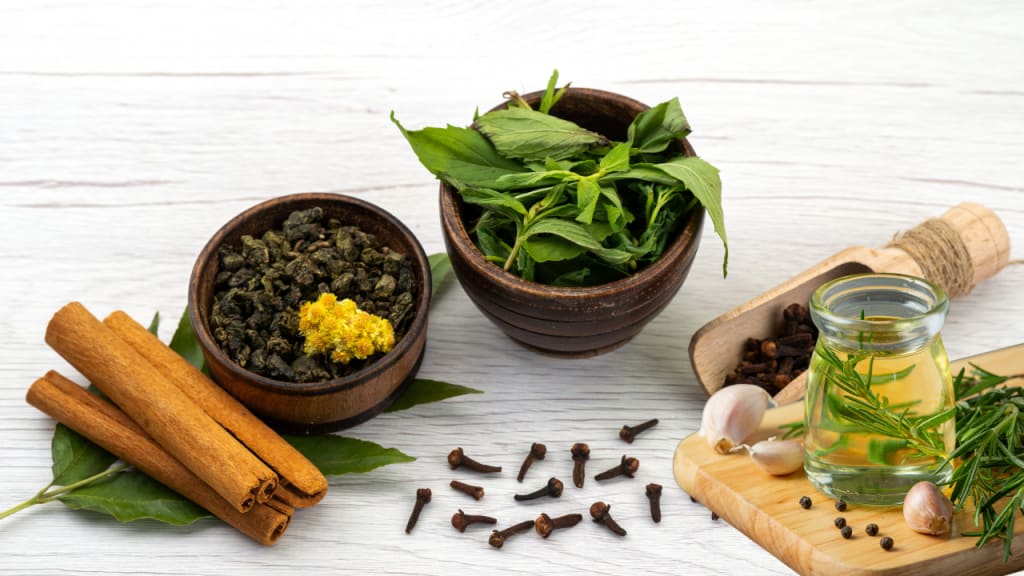A Guide to Common Medicinal Herbs:
Nature’s Healing Power

In a world brimming with synthetic medicines, the healing potential of nature's offerings often goes overlooked. Medicinal herbs, long revered for their therapeutic properties, have been used for centuries to address various ailments and promote well-being. In this guide, will explore some common medicinal herbs, their benefits, and how they can be used for health and healing.
Lavender: Known for its calming scent, lavender isn't just for fragrance; it holds medicinal properties. This herb can aid in reducing stress and anxiety. It's often used in aromatherapy, essential oils, or teas. Lavender may also help in promoting better sleep and relieving headaches.
Chamomile: This gentle herb is widely recognized for its calming effects. Chamomile is used to alleviate insomnia, reduce stress, and soothe digestive issues. It's commonly consumed as a tea and is known for its mild, pleasant flavor.
Peppermint: With its refreshing scent and taste, peppermint is more than just a flavoring agent. It helps with digestive problems, such as bloating and indigestion. Peppermint oil can also relieve tension headaches when applied topically.
Echinacea: Often used to boost the immune system, echinacea is believed to shorten the duration of colds and flu. It's available in various forms, including teas, capsules, and extracts.
Ginger: A common kitchen herb, ginger has potent anti-inflammatory properties and is excellent for digestion. It can ease nausea, reduce muscle pain, and help with sore throats. Ginger is consumed fresh, dried, or as a tea.
Garlic: Known for more than just its pungent flavor, garlic is a powerhouse for boosting the immune system. It has antibacterial and antiviral properties and is believed to lower blood pressure and cholesterol.
Turmeric: This bright yellow herb contains curcumin, a compound with strong anti-inflammatory effects. Turmeric is used to alleviate arthritis pain, support liver health, and aid in digestion. It can be consumed fresh, dried, or as a supplement.
Aloe Vera: Beyond its topical use for skin burns, aloe vera is also consumed internally. It supports digestive health and is believed to have anti-inflammatory effects.
Holy Basil (Tulsi): Revered in Ayurvedic medicine, holy basil is known for its adaptogenic properties, helping the body adapt to stress. It's consumed as a tea and is considered beneficial for overall well-being.
Rosemary: Beyond being a flavorful herb in cooking, rosemary contains antioxidants and has been associated with improved digestion, enhanced memory, and improved mood.
While these herbs offer various health benefits, it's important to use them judiciously and understand any potential interactions with medications or existing health conditions. Always consult with a healthcare professional before incorporating new herbs into your routine, especially if you're pregnant, nursing, or have a chronic illness.
When using medicinal herbs, quality matters. Ensure you source herbs from reputable suppliers, and if possible, opt for organic varieties to avoid exposure to pesticides and other chemicals.
Herbs can be consumed in various forms:
Teas: Infusing herbs in hot water is a common and easy way to extract their beneficial properties.
Supplements: Capsules, tablets, and liquid extracts are available for convenient use.
Topical Applications: Oils, creams, and ointments can be used for skin-related issues.
It's important to start with small amounts to check for any allergic reactions or side effects. Gradually increase the dosage if well-tolerated.
Remember, while herbs can be powerful allies in promoting health, they're not a substitute for professional medical advice or prescribed medications. They should be used as complementary support under the guidance of a healthcare provider.
In conclusion, the use of medicinal herbs as a natural approach to health and well-being has gained significant popularity. From lavender’s calming effects to ginger’s digestive benefits and turmeric's anti-inflammatory properties, these herbs offer a treasure trove of wellness support. When used mindfully and responsibly, they can be valuable assets in our journey towards a healthier lifestyle. Learn more click here





Comments
There are no comments for this story
Be the first to respond and start the conversation.